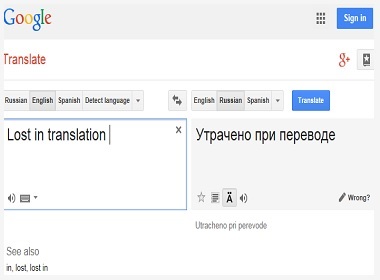

However, sometimes there are problems in translation, which could be easily avoided. All you need to do is just write better.
6 tips that will prevent the problem of “Lost in Translation”
- Write in short sentences
This tip is simple — the shorter is your sentence, the less is the chance that the meaning may get distorted. If you can put a full stop instead of a comma, do it.
- Use simple words and structures
Long, complicated words may not have passable translations. Intricate constructions and idioms, sayings and proverbs are hard to interpret adequately. Simple words, on the other hand, often don’t require using a dictionary or an online translator, as people understand them straight away. Be clear in what you want to say, and then express it with clarity and simplicity. This will show your intelligence better than complicated constructions. (How smart do you think is to use sentences that the other person certainly won’t understand?)
- Humour is great when it’s understood
If you are sure your jokes will be understood, go ahead. Otherwise, say what you mean. Your sarcasm may be missed, and she may think you really think this way.
- Double meanings
There are words that have several meanings, and online translators will typically pick the most common one. Try to avoid words that could be misinterpreted.
- Spell check
Again, this is just common sense, but many guys type in a hurry, and then online translators gaggle on their words, because they are incorrectly spelled. Most browsers today offer a built-in spell check, use it. Give it 15-second overlook before pressing the button “Send”.
- Caps and punctuation
All caps and no caps are both sins in online communication. It doesn’t take longer to type grammatically correct as opposed to incorrect. Extra commas and no commas may change meaning of your sentences. You don’t have to hire proofreaders, but if the sentence doesn’t sound 100% clear, change it before sending to your non-native speaking pen pal.
Share this article














This makes me think of Dunglish: “a popular term for mistakes native Dutch speakers make when trying to speak English”.
“Errors occur mainly in pronunciation, word order and the meaning of words. Former Dutch ambassador and prime minister Dries van Agt supposedly once said “I can stand my little man” (translation of ik kan mijn mannetje staan, a Dutch idiom meaning roughly “I can stand up for myself”). The former leader of the Dutch Liberal Party, Frits Bolkestein, repeatedly referred to economic prospects as “golden showers”, unaware of the term’s sexual connotation.”
Link to Dunglish article on Wikipedia.
Being in correspondence on the dating site, I got letters not only in English but also in other languages. I remember how difficult it was to catch the meaning of the letter when you translate it online. It happened that I got strange or even offensive translation. However, I’ve never left misunderstandings in correspondence because I knew it could have sad influence on future relations. Don’t be afraid to say that you have problems with translation and kindly ask to write the same using other words.
It’s a great challenge to chat without knowing the native language of your partner. Though contemporary on-line translators help us, they are not perfect. It is really very difficult to express fully your feelings and emotions through on-line translators.
I’m corresponding with a woman whose English is limited. I write to her in English and she writes back in English. We do this to help her improve her English. What I do, when I need to convey a complex thought, is to translate my English to Russian and then take that result and translate it back to English. I can then tweak my English until the I get the English->Russian->English result I want.
Bruce,
Yes, it’s a good way to do it.
I would also add to the above in that you should make it clear that you are using on-line translators. That way both of you can be more understanding of “funny language”. There is a lady I communicate with where we have a joke called “Google Bomb”. Whenever one of us is concerned about the language, then the other quickly says “Google Bomb” so we know the translator has “misunderstood”. This has stopped many unnecessary arguments. I also 100% agree about using short sentences. One of the lessons I found is that the longer the sentence the more likely an… Read more »
Sorry I meant “one to verify the other, ie., (1) English > Russian – copy/paste to the other tool and Russian to English. If you have the time this is a very useful tip!”